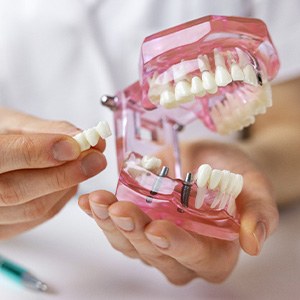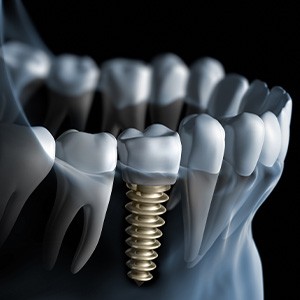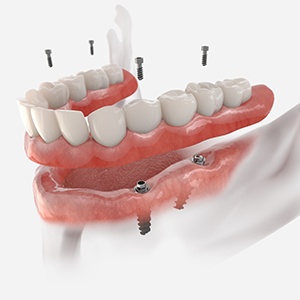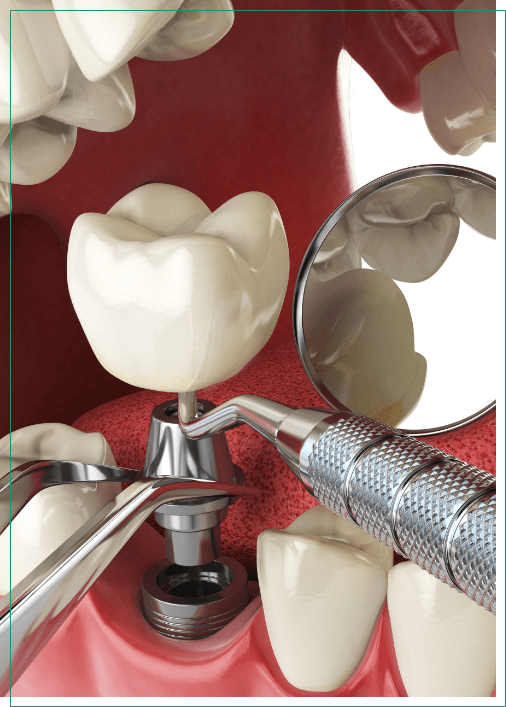When it comes to replacing missing teeth, dental technology continues to deliver—and dental implants have quickly risen among the ranks of tooth restoration options due to their unique placement method and unparalleled benefits. We’re thrilled to work with some of the highest-rated oral surgeons in the area to assist you with your dental implant placement if you choose to go this route, or have Dr. Harless place it. After it is placed, Dr. Harless can assist you with every other stage of the process of restoring your smile with dental implants in Boise.
Why Choose Southwest Dental Arts for Dental Implants?
- Dentist with 20+ Years of Experience
- Partnered with Trustworthy Specialists
- Realistic, Natural-Looking Results
What Are Dental Implants?
Dental implants are the name of the game when it comes to replacing missing teeth; while traditional restorations such as bridges and dentures rely on healthy adjacent teeth or adhesives to remain in place, dental implants utilize posts that have been surgically placed into the patient’s jawbone. This leads to outstanding support, unmatched jawbone preservation, and the entire replacement of the lost tooth’s structure. And the best part is that dental implants can replace any number of missing teeth, from one to all of them!
The 4-Step Dental Implant Process
There are four steps required for successful dental implant placement. Although each person’s treatment plan will be different, these necessary phases are required to ensure these artificial teeth and titanium posts remain in place for an extended period of time. If you are interested in learning more about this process and what you can expect when preparing for dental implants, keep reading or call our office to schedule an appointment.
Initial Dental Implant Consultation

The first step requires a scheduled implant consultation with a member of our dental team. As the starting point for any kind of treatment, this will allow us to inquire about your oral and overall health as well as the state of your jawbone and if it’s dense enough to adequately support your new set of teeth.
You can expect to find out if you need preliminary treatment, as this will be necessary if you show signs of tooth decay, cavities, or gum disease. We’ll also evaluate your jawbone to find out if bone grafting is required to create greater density in what will be the foundation of your new smile.
Dental Implant Surgery

We’re proud to partner with top-rated local oral surgeons for your dental implant post placement; the surgery itself is straightforward, but as with any oral surgery, certain precautions and guidelines must be followed. We’ll refer you to an outside specialist who will review our notes before preparing you for surgery. You will receive local anesthesia before small incisions are created in the gums to position and place each implant into its desired socket.
Once finished, they will close your gum tissues before applying protective healing caps over the areas.
Dental Implant Osseointegration/Abutment

Allowing your dental implants to fuse with the jawbone is essential, so spending ample time at home recovering will allow osseointegration to occur. While you may feel fine returning to work after only a few days, you’ll need to take precautions to avoid dental implant failure during this time. This means staying away from hard foods, not smoking, and practicing good oral hygiene.
Once your implant posts are in place and properly fused with the jawbone, we will place the metal abutments, which help hold your restoration to each implant.
Delivery of Dental Implant Restorations

The last step in the dental implant placement process is receiving your newly crafted restoration. During your initial consultation, we will determine which type you’ll need (i.e., dental crown, dental bridge, or denture) This will allow lab technicians to build your restoration using digital impressions taken of your mouth.
When ready, we’ll secure it in place on top of your abutments so that you can begin to enjoy your new set of teeth and the many benefits they provide.
Who Dental Implants Can Help
If you are considering this state-of-the-art tooth-replacement solution for yourself, we have good news: dental implants are incredibly versatile. The easiest way to find out if you’re a candidate is by scheduling a consultation at our Boise dental office. If that appointment is already on the calendar but you want to learn a little more about who dental implants can help in the meantime, then read on!
Who Is a Good Candidate for Dental Implants?

Simply put, the consultation is an important part of the dental implant treatment process. At this appointment, we will review your medical history, learn about any medications you’re taking, conduct a comprehensive oral exam, assess the density of your jawbone, and discuss your current oral hygiene regimen. The goal? To determine if this is the best tooth-replacement solution for you. If it’s not, then we will go over the other options available, like traditional bridges and dentures.
Missing One Tooth

Whether you are missing one of your front teeth or a back molar, you shouldn’t hesitate to schedule an appointment with us to discuss dental implants. If we determine that you’re a good candidate, then an implant will be surgically inserted into your jawbone and a custom dental crown will be secured on top so both the root and crown of your tooth are restored. One of the biggest perks of this tooth-replacement solution is that it can last for 30+ years too!
Missing Multiple Teeth

Previously, there was only one option for replacing several teeth consecutively: a traditional bridge. Now, we can fill the gap in your smile with an implant bridge, which doesn’t require any of your natural teeth to be altered. Instead, an implant is placed on either side of the gap, and the replacement teeth “bridge” it perfectly, providing a complete, healthy, and beautiful smile.
Important note: If you are missing several teeth throughout your mouth, we can also use dental implants to secure your replacement teeth in place!
Missing All Teeth

If you are missing all of your teeth, then you know just how difficult it can be to eat a well-balanced diet, communicate clearly, and smile confidently. That’s where implant dentures come in. By securing a custom denture to strategically placed dental implants, we can restore the look, health, and function of your smile. Plus, they are easy to care for, they can last for well over a decade, and they are unmatched when it comes to stability.
Benefits of Dental Implants
Dental implants are incredibly versatile since they can replace one tooth, an entire arch of missing teeth, and everything in between. Of course, that’s just one benefit. When you choose this state-of-the-art tooth-replacement solution, you’re gaining access to many incredible perks that dentures and dental bridges simply cannot offer. With this in mind, keep reading to learn a few advantages of dental implants:
Day-to-Day Benefits

Here are a few of the many day-to-day benefits you’ll enjoy with dental implants:
- Dental implants are easy to maintain: In short, you don’t need special oral hygiene products to keep your dental implants in pristine condition. All you need to do is be proactive about caring for them, just like your natural teeth! That includes brushing twice a day and visiting us twice a year for a checkup and cleaning.
- Dental implants increase your confidence: Although all tooth-replacement solutions are custom-made, that’s not the only factor that impacts your confidence. Dental implants, for example, don’t move when you smile, talk, or chew, preventing you from being self-conscious as you go about your day.
- Dental implants allow you to eat most foods: While tooth loss restricts your diet, dental implants expand your diet! Since they get their support from your jawbone and are crafted from high-quality dental materials, you’ll be able to enjoy all of your favorite foods again, even crunchier ones!
Health Benefits

Below are a few noteworthy health benefits that come with dental implants:
- Dental implants preserve your jawbone: While dentures rest against your gums and dental bridges get support from surrounding teeth, dental implants are inserted directly into your jawbone. So, every time you chew, your jawbone will be stimulated, which helps prevent bone loss.
- Dental implants protect your natural teeth: We mentioned above that dental bridges get support from surrounding teeth. That’s true, and sometimes it requires even healthy ones to be altered. The same cannot be said for dental implants. They are self-supporting and help prevent other oral health problems, like dental drift.
- Dental implants benefit your overall health: Sadly, tooth loss takes a toll on your overall health. The good news is that dental implants can replace one, a few, or all of your teeth, decreasing your risk of problems like indigestion and malnutrition in the process.
Long-Term Benefits

In the following section, you’ll find some noteworthy long-term benefits of dental implants:
- Dental implants have a high success rate: Naturally, you want to invest your time and money in a treatment that has a high success rate, and dental implants do! It’s around 95%, but it’s even higher among non-smoking patients.
- Dental implants preserve your youthful appearance: You might have realized that missing teeth can result in a sunken-in, aged appearance. Fortunately, dental implants fill the gaps in your smile while also preserving your jawbone, creating a more youthful look overall.
- Dental implants are long-lasting: Depending on how you care for your dental implants, they can last 30+ years!
Understanding the Cost of Dental Implants
For most patients, the cost of treatment is a deciding factor in their tooth replacement. Unfortunately, because we customize dental implants in each case, we can’t generalize a cookie-cutter estimate for dental implants. We can only give an accurate price quote after we’ve had the chance to examine your mouth and get an idea of what you’ll need in a consultation. However, regardless of the cost, we are happy to work with you to make your fully restored smile a financially reachable goal.
Preliminary Treatments & Dental Implant Surgery

In some cases, before the implants can be put in, preparatory procedures are necessary. If you require a bone graft, gum disease treatment, and additional tooth extraction, these additional treatments will contribute to the overall cost. The surgery itself will vary in cost based on how many implants you receive and the time it takes to place the posts.
The Parts of Your Dental Implant

Did you know that there are different types of dental implants with several choices of brands and models? In this way, implants are just like many other products. When planning your implants, Dr. Harless considers these various brands and types of implants, selecting the one(s) that will best serve your smile in the long term. As a result, even the parts of an implant (i.e., post, abutment, and restoration) will affect the cost.
How Dental Implants Could Save You Money

With traditional dentures, you have to pay to replace your prosthetic teeth about every five years. Normal bridges last about 10 years before requiring a new restoration. Over time, the cost of replacement can add up!
On the other hand, dental implants can go for several decades and still be in excellent condition. Although dental implants come with a higher upfront price, over the years you may find that dental implants cost less than traditional replacements. Plus, in the meantime, you get to enjoy benefits that dentures and bridges can’t offer. In other words, implants are well worth the price you pay!
Does My Dental Insurance Cover Dental Implants?

Not all dental insurance policies are exactly alike, but in general, plans don’t include dental implant coverage. However, some parts of the overall treatment may be partially covered. For instance, if you require preliminary procedures, such as gum disease treatment or tooth extraction, your cost may be reduced. The restoration should also be partially paid for by your insurance company, helping you spend less out of your own pocket. During your consultation, we’ll look at your policy and try to find as many opportunities as possible for you to save.
Making Dental Implants Affordable

If you don’t have dental insurance, you may be worried about taking on the cost all on your own, but we offer an alternative that could help you save: our in-house savings plan. This plan comes with routine preventive care but also includes a 20 percent discount on necessary and elective restorative care. In other words, you could avoid having to pay full price.
In addition, you can defray the cost of dental implants over time through financing with Sunbit, Alphaeon, or CareCredit. We trust these companies and can help you through the application process.
Dental Implant FAQs
Getting dental implants is generally not painful during the procedure itself because we use local anesthesia to numb the area. You may feel pressure or mild discomfort, but pain is typically well-controlled. For patients with anxiety or those undergoing more complex procedures, sedation options are available to ensure a comfortable experience.
After the surgery, it's normal to experience some discomfort, swelling, or soreness for a few days as your mouth heals. This post-operative pain is usually manageable with over-the-counter pain medications and following our aftercare instructions.
Most patients find that the temporary discomfort is worth the long-term benefits of having strong, functional, and natural-looking teeth. We’ll be with you throughout the process to ensure minimal discomfort and a smooth recovery.
Signs of a failing dental implant can include several symptoms. If you notice persistent pain or discomfort around the implant site, especially after the initial healing period, it could be a sign of infection or implant instability. Swelling or inflammation of the gums, bleeding, or pus around the implant area are also warning signs.
Another indicator is if the implant feels loose or shifts when touched, which may signal a failure to integrate with the bone properly. Gum recession, where the tissue pulls back from the implant, or difficulty chewing, can also be signs of an issue.
If you experience any of these symptoms, it’s essential to contact us promptly. Early intervention can often resolve problems and prevent complete failure of the implant.
Recovery from dental implant surgery typically takes a few days to a week for initial healing. During this time, you may experience mild discomfort, swelling, or bruising, which usually improves after 3 to 5 days. Over-the-counter pain medications and proper aftercare will help manage these symptoms.
However, the full recovery process, where the implant integrates with the jawbone (known as osseointegration), takes around 3 to 6 months. This healing phase is crucial for the implant's stability, but most patients can resume normal activities within a week, with some dietary restrictions to avoid stressing the implant.
We’ll monitor your healing progress through follow-up visits to ensure everything is going smoothly.
Yes, you can get dental implants if you smoke, but smoking can significantly impact the success of the procedure. Smoking slows down healing by reducing blood flow to your gums, which can lead to a higher risk of infection, implant failure, or complications like gum disease. It can also interfere with osseointegration, the process where the implant fuses with your jawbone.
We strongly recommend quitting or at least reducing smoking, especially during the healing period. Doing so can improve your chances of a successful implant and reduce the risk of long-term complications. If quitting seems difficult, we can offer advice on how to manage smoking during the treatment process to optimize your implant’s success.




